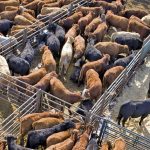PHOENIX, Arizona — U.S. agriculture secretary Tom Vilsack has conceded that country-of-origin labelling contradicts his government’s international trade promotion policies and free trade agreements.
“The Congress has directed us to do one thing, which is to label, designate and identify U.S. made products,” Vilsack told the Commodity Classic conference in Phoenix last week.
“That, in and of itself, doesn’t create issues with international trade. That’s informing consumers that this product has a U.S. focus.
View the video of his comments below.
Read Also

VIDEO: Catch up with the Western Producer Markets Desk
The Western Producer Markets Desk provides daily updates on agricultural markets, with recent video commentary including looks into canola, wheat, cattle and feed grains.
“Within the (World Trade Organization), however, if you create situations in which producers in other states (such as Canada) are put at a disadvantage, then WTO says you can’t do that.”
Vilsack said he believes the WTO has said COOL causes the segregation of livestock in the processing and feeding systems, which creates an unfair advantage for American farmers and processors.
“And that’s a problem,” he said.
“Congress is telling us to do one thing and the WTO is telling us, ‘the way you are doing it, you can’t do it,’ ” he said.
“Sometimes you can kind of square that hole, but in this case, I don’t think you can.”
Vilsack said the $1 billion a year in damages that the Canadian industry is claiming for beef is too high and might interfere with settlement of the issue.
He said Canada will likely win the WTO appeal if Congress doesn’t repeal the law. Action on the issue is expected in May, he added.
The WTO appellant panel met in mid-February to review the American appeal.
Canadian government officials have said they would place punishing tariffs against a long list of American products, with a 100 percent tariff on American beef and pork, unless the U.S. complied with the WTO order.
The Canadian Cattlemen’s Association has complained that COOL has cost cattle producers $25 to $40 per head since its inception.
A WTO ruling in Canada’s favour would allow the federal government to seek retaliatory tariffs on $1.1 billion worth of imported U.S. goods and commodities. It released a list of potential commodities targeted for retaliation in summer 2013.
The CCA feels the $1.1 billion figure, based on the annual damages suffered under the 2009 COOL rule, will actually be higher after Congress amended the law May 23, 2013.
michael.raine@producer.com















